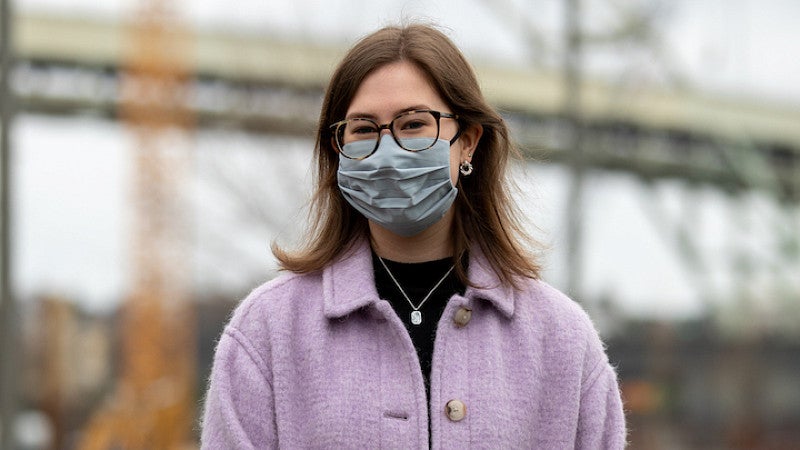
Emily Fowler
Story by Lauren Church, CHC Communications
Photo by Maddie Knight, CHC Communications
CHC senior and Wayne Morse Scholar Emily Fowler was in a Zoom class when she learned she had been invited into the prestigious Venture for America (VFA) fellowship. She tried to stay composed as she read the program director’s acceptance message on camera, silently celebrating her victory as the first University of Oregon student to be invited into the cohort. Fowler says that without CHC’s supportive community, she never would have applied.
For each year’s fellowship, Venture for America selects a small group of college graduates who share the potential of becoming tomorrow’s most prominent mission-driven entrepreneurs. Only 10% of applicants are accepted into the program. The fellowship prepares members to establish and grow a business themselves, connecting them with a valuable professional network that will help them along the way. Additionally, VFA offers financial support for fellows’ startups after they complete the program.
Fowler studies political science and media studies, though her interests span across many disciplines. She has been involved in several on-campus organizations including UO Mock Trial and the CHC Student Association. Beginning in April, Fowler helped create a cookbook Cooking While Quarantined with her UO political science professor, Alison Gash, as well as other students and alumni. The group decided to donate the book’s proceeds to the Black Food Sovereignty Coalition and the Community Alliance for Global Justice.
Fowler’s professional interests, however, lie in digital rights and artificial intelligence.
“It’s very easy to focus on the things that are wrong with technology — especially now,” she said. “I’ve definitely thought of the internet as a weapon for evil more than anything else.”
Fowler’s introduction to civic technology through an internship last year flipped her pessimistic perspective to optimism. She worked at a Eugene-based civic technology start-up, Terrapin Data, where mentors taught her mission-driven computer programming and data analytics.
“Working there was revolutionary for me,” Fowler said. “I was able to see how technology and internet innovation, especially, can be forces for good.”
Fowler sees civil technology’s potential to help solve important democratic dilemmas such as food insecurity, voter mobilization, climate change mitigation and economic inequity. Through her fellowship at VFA, Fowler hopes she will learn how to develop solutions to the social problems she studies in classes and thinks about every day. One specific issue she hopes to tackle throughout her career is power manipulation on the internet.
“A lot of interesting debates are coming out about ownership of the net, data governance and what liberties people have online,” Fowler said. Her CHC thesis project reflects her humanitarian interests, as it investigates how artificial intelligence affects elections.
Eventually, Fowler hopes to investigate digital policy and privacy. Since people on the web interact with each other from all around the world, she says it’s important to establish international agreements on digital liberties.
“Hopefully, one day I can look back and know the internet is a better place and a more equal place because of my work,” Fowler said.
During her fellowship, Fowler will help lead a new mission-driven tech start-up— an experience which will offer her a unique opportunity to understand the technology she one day intends to govern.
“I want to be a part of a solution to a problem and achieve something really tangible after I graduate but before I get a master’s or law degree,” Fowler said.
Through the VFA fellowship, her work in civic technology for the next few years will allow her to do just that.
